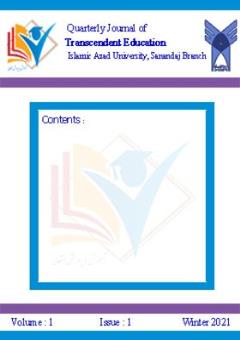The classroom management model based on the design and test of classroom management in Lorestan province (case study of second year secondary school teachers).
Subject Areas : Education
Seyede sohila Tabatabaie Rad
1
![]() ,
iraj nikpey
2
,
moslem ghobadiyan
3
,
iraj nikpey
2
,
moslem ghobadiyan
3
1 - Educational Management, khorramabad branch,Islamic Azad university,khorramabad,Iran.
2 - Associate professor, Department of Educational Sciences, Lorestan University,Iran.
3 - Department of Educational Sciences,Farhangian University,P.O.BoX 14665-889 Tehran,Iran.
Keywords: Behavior ", , ", Teaching", , ", Implementation", , ", ,
Abstract :
Introduction:The present research was conducted with the aim of designing a classroom management model for teachers of the secondary highschool teachers of Lorestan province. research methodology:The statistical population in the qualitative phase included experts of educational sciences and educational management fields of Lorestan universities, a number of 36 people, and in the quantitative phase, all of the secondary highschool teachers of Lorestan province, a number of 4203 people (2114 men and 2089 women). To determine the sample size of the experts' statistical population, targeted sampling methods and theoretical saturation method including 13 people were used and the statistical population of senior highschool teachers of Lorestan province using the Karjesi-Morgan table a number of 351 people (177 male and 174 female) were determined as the statistical sample and selected by random cluster sampling method. Findings: Thus, Both research tools (interview and questionnaire) had good validity and reliability.At the end of the Delphi technique and categorization of concepts, six components of behavior management, teaching management, implementation management, evaluation management, learning management, motivation management and 56 codes were taken. Conclusion: The results showed the fit indices of the measurement model are accepted and show a good fit of the model. As a result, this shows the alignment of the proposed components with the classroom management of the teachers, so the variable components of the management of the class are (at the 99% confidence level) significant and in the form of a conceptual model next to each other, they confirm the classroom management correctly.


